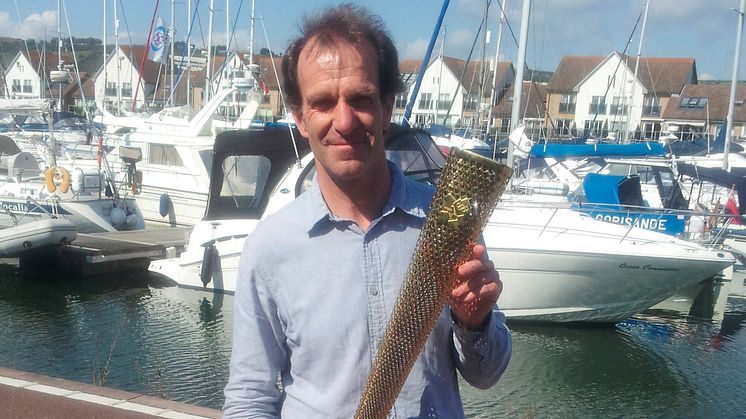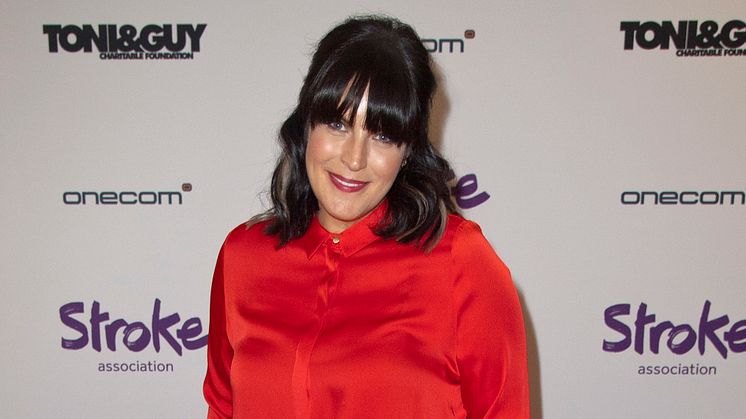
Press release -
Portsmouth stroke survivor urges people to make 'one small change' to reduce their risk of stroke
A Portsmouth man who fought back from the brink of death after a severe stroke is backing the Stroke Association’s plea for people to make one small change to reduce their own risk of having a stroke.
Roger Sherliker’s family were told it was “95% certain” that he would die after his stroke in January 2017.
He survived but the stroke damaged the part of his brain which controls communication and has left him unable to speak or read and write properly, and unable to return to work as a chartered surveyor.
Nine out of ten strokes are linked to lifestyle factors such as smoking or obesity and the risk could be reduced by making changes. The Stroke Association is calling for people to make a one small change starting on Stroke Prevention Day, Friday 14 January.
Roger says that stress at work was a factor in his stroke.
“Just before my stroke I was under a lot of pressure at work,” said Roger. “If I had known I was at risk of a stroke I would have talked to my boss about the stress I felt and asked for help to reduce it.”
Roger was a fit and healthy 58-year-old when he had his stroke in January 2017.
“It was a Saturday and I decided to go to an outdoor boot camp session to enjoy some challenging outdoor exercise while my wife Pat went to her usual yoga class.
“I often attended these classes with my daughter and was generally fit. I coached amateur rugby teams locally and was also an athletics coach. I was selected to carry the Olympic Torch through Southampton in 2012 in recognition of my work in the community.
“As I exercised this time, I became aware that my vision was becoming skewed and I remember collapsing. The instructor realised I was having a stroke and called an ambulance straight away.
“If I had decided to stay at home that morning I would not have been so fortunate. I remember the journey in the ambulance but then I have no memory of the next two weeks.
“I am told I had a three hour operation to try and dissolve the clot which had caused the stroke but it was unsuccessful. Four days after the stroke I started moving my arms and it looked as though I may be waking up.
“The doctors told my family that this was a sign that my brain was shutting down and that it was 95% certain I would die within 24 hours. Somehow, I pulled through and woke up 48 hours later.
“I spent seven weeks in hospital and received intensive therapy. I have aphasia which for me means I can understand what people say to me but have to work hard to find the right words.
“I also have dyspraxia so although I now live alone I need carers to help with meal preparation. I can no longer effectively read or write but still get a great deal of pleasure from music.
“I have rebuilt my fitness level, despite some pain in my right arm and hand following the stroke, and walk for at least two hours a day as well as taking part in walking football and yoga.
“After my discharge from hospital I was very grateful for the six months of speech and language therapy that I had from the Community Stroke Rehabilitation Team (CSRT) based at Queen Alexandra Hospital in Portsmouth.
“I was referred to Graham Wake from the Stroke Association and he provided invaluable support via his workshops and Communication Support Group. I also started attending a Reading and Writing Group run by a volunteer with the Stroke Association.
“During lockdown I have been helped to attend Graham’s Zoom Communication Support Group sessions as I cannot use IT alone now. I have also enjoyed the Group sessions run by InterAct Stroke Support and their one-to-one phone sessions when no-one was available to help me connect to Zoom.
“Eighteen months after my stroke my wife was diagnosed with cancer and she died less than a year later. My family helped me move to a city centre flat which is close to many public transport options so I can stay connected as I can no longer drive.
“I was in full-time employment before my stroke but I could not return after my stroke. My daughters Gemma and Kessia, the rest of my family and friends have been an enormous support to me and helped me build a new life.
“Every morning I wake up is my moment of hope. I am so grateful and happy to be alive. I know life is tenuous and I am determined to make the most of my second chance.
“I feel very grateful for all I have but it has not been easy and sometimes my thoughts and feelings are very complicated and tangled.
“A stroke does not have to define you. You can build a new life but it will be different from your life before the stroke.
“That can be hard to accept but you will find the support to do so from the Stroke Association, family and friends. I take pleasure in every day and enjoy the simple things in life. A long walk with a friend, a cup of coffee, simple things that can bring such joy every day.
“I have been so fortunate with the help and support I have received from the NHS through the CSRT and from the Stroke Association."
Topics
Categories
Regions
- Stroke strikes every five minutes in the UK and it changes lives in an instant.
- The Stroke Association is a charity working across the UK to support people to rebuild their lives after stroke. We believe that everyone deserves to live the best life they can after stroke. From local support services and groups, to online information and support, anyone affected by stroke can visit stroke.org.uk or call our dedicated Stroke Helpline on 0303 3033 100 to find out about support available locally.
- Our specialist support, research and campaigning are only possible with the courage and determination of the stroke community and the generosity of our supporters. With more donations and support, we can help rebuild even more lives.
- You can follow us on Twitter, Facebook and Instagram.



